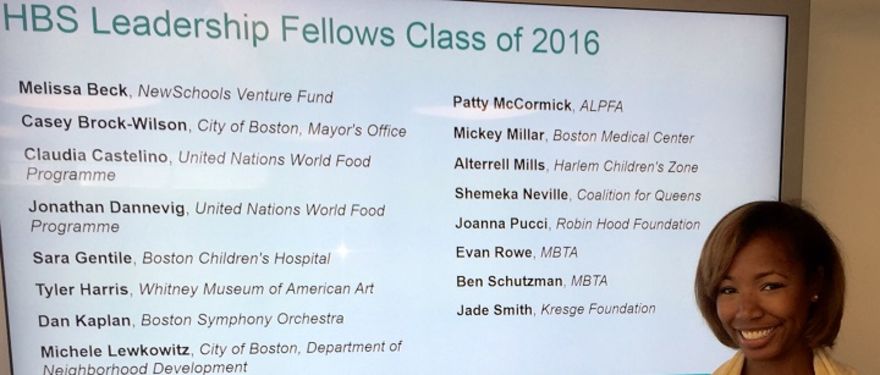Business school was my escape. I saw it as a way out of a career in finance that I could no longer envision myself in. It was an opportunity to open the door to social enterprise, what I saw as the nexus of my interests in the private sector, social justice, and economic development.
While I thought business school would be my savior, prior to applying to
business school, I ended up being “rescued” by an international opportunity to
work in Chile at a non-profit called Endeavor that mentors and supports
high-impact entrepreneurs in emerging markets. After three years in Sales &
Trading, I packed my bags for a two-year life-changing adventure in Chile. As I
sought to learn the language of business and get a sense of what potential
career paths could be for me, business school still summoned me.
Coming into business school, there were two things that I knew for sure: 1) I wanted nothing to do with finance in any shape or form and 2) I wanted to find a career with meaning that would combine my aforementioned interests. I was less sure about what function I wanted, but I was intrigued by international strategy roles. I quickly found that while business school makes career switching more likely, it still requires much effort and perseverance.
For prospective students wanting to switch careers after business school, it’s important to realize that there will be stepping stones to getting to your ultimate, dream job. I came across tons of interesting opportunities for strategy roles on the HBS recruiting platform, but most of them required previous experience in either management consulting or investment banking, neither of which I had. While business school can be a conduit to your life’s work, it’s not always immediate. However, it’s important not to give up. My advice would be to consider what your career goal is 5-10 years from now, and distill the role into the skills and experiences that you’ll need to succeed. Luckily, I realized prior to starting at HBS that I needed more industry exposure, and strategy and operations experience.
For me, many signs pointed to consulting. I set my sights on consulting when recruiting for summer internships. I didn't end up finding a consulting internship, but I landed a role at a start-up analyzing opportunities and developing a plan for international expansion. Through my summer internship, I learned a great deal about myself and what I wanted and did not want in a role. The most important takeaway from my internship was a reminder for what I came to business school for: finding a career where I could apply private sector solutions to social and economic inequity.
With my renewed sense of self, I went into full-time recruiting with a very clear agenda that I would give consulting another go and that I would look into opportunities offered through the Social Enterprise Initiative (SEI). SEI is a department at HBS that continuously seeks to offer courses and career opportunities within the social sector to MBAs.
One career opportunity through the SEI is the HBS Leadership Fellows program which enables recent graduates to work alongside senior management on strategic initiatives at non-profits or public sector organizations for a year. With intense focus paired with a reignited passion, I was able to land a Leadership Fellow Position as the Special Advisor to the President at the Kresge Foundation, a philanthropic organization in metro Detroit focused on urban economic development. I will be able to hone my strategy skills within a social sector context and then continue into consulting at the Boston Consulting Group.
I have been grateful that business school, and HBS specifically, has enabled me to discover and rediscover both my personal and professional interests.

